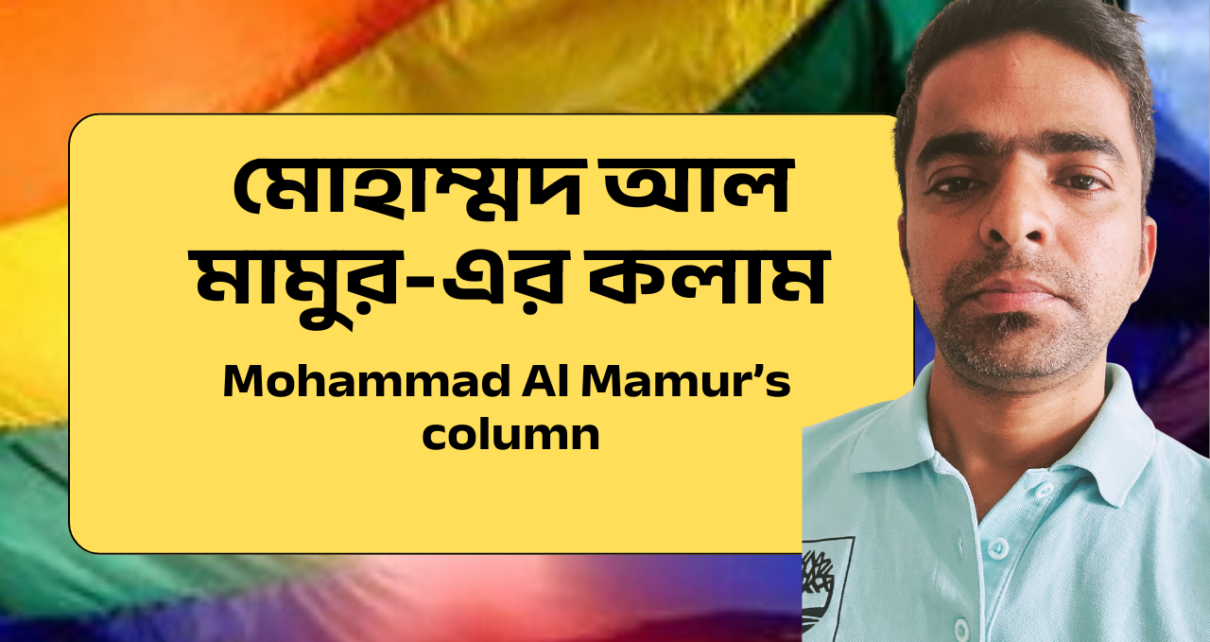Mohammad Al Mamur, United Kingdom
I. A Law Older Than the Nation
Section 377 of the Penal Code, drafted by the British in 1860, survives in Bangladesh as the most persistent scar of colonial moral engineering. It criminalises “carnal intercourse against the order of nature,” a phrase so vague that it has become a net capable of catching every private act of affection that defies heteronormative approval. What was once the obsession of Victorian evangelicals has been inherited by a modern republic that should have known better.
II. Criminalising Intimacy, Not Crime
Unlike theft or assault, Section 377 requires no victim. It converts love itself into evidence. In practice, it allows police intrusion into bedrooms, arrests without complaint, and public humiliation of citizens whose only transgression is being different. The law does not safeguard morality; it sanctifies persecution.
III. Colonial Continuity, Religious Cloak
When the British departed, they left behind both railways and repression. Where India repealed its equivalent provision in 2018, Bangladesh has fortified it with religious rhetoric. Politicians invoke faith to preserve a statute born of empire, transforming colonial prejudice into theological virtue. Thus, two incompatible legacies—Christian prudery and Islamic conservatism—now collaborate to keep love illegal.
IV. Judicial Silence and Executive Fear
No Bangladeshi court has dared confront Section 377. The judiciary that once struck down unconstitutional martial-law decrees remains mute on this simplest question of privacy. The executive, terrified of clerical backlash, hides behind the myth of “social readiness.” Human rights cannot wait for majoritarian permission.
V. The Law as Extortion
Police seldom prosecute under Section 377; they exploit it. Blackmail, threats of arrest, and forced confessions are routine. Gay men are coerced into paying bribes; trans women are forced into silence. The statute functions as a portable trapdoor: anyone can fall through it whenever authority wishes.
VI. The International Lens
Bangladesh has ratified the ICCPR and CEDAW, both of which guarantee equality and privacy. Continuing to enforce Section 377 violates these obligations and invites moral censure. The state cannot claim modernity abroad while defending medievalism at home.
VII. Repeal as Redemption
Repeal would not erode religion, culture, or family; it would restore constitutional sanity. The removal of Section 377 would signal that Bangladesh belongs to its citizens, not to inherited phobias. The nation that once broke free from colonial chains must now free its heart.
Article 3: Faith, Fear, and Free Thought — The Peril of Being an Atheist in Bangladesh
I. Introduction – Where Belief Is Compulsory
To doubt is human, yet in Bangladesh, doubt can be fatal. Atheists and secular writers live under an invisible decree: believe publicly, or bleed privately. The country that proclaims freedom of conscience in its Constitution has turned disbelief into treason.
II. From Constitution to Contradiction
Article 41 of the Constitution guarantees freedom of thought and religion, but Article 2A declares Islam the state religion. This paradox breeds hypocrisy: citizens may technically reject religion, but in practice the state enforces piety through law, education, and politics. The result is a republic of fear disguised as faith.
III. The Bloodied Decade
Between 2013 and 2016, at least a dozen bloggers and freethinkers were hacked to death by Islamist militants. Avijit Roy, Washiqur Rahman, Niloy Neel, and others were murdered in broad daylight while police stood yards away. Their crime: writing. Their killers were celebrated by mobs as defenders of Islam. The government condemned the violence, yet prosecuted survivors for “hurting religious sentiment.” Justice bled out with the victims.
IV. Blasphemy Without a Law
Bangladesh has no explicit blasphemy statute, but Section 295A of the Penal Code punishes “outraging religious feelings” with imprisonment. Its vagueness allows clerics to file cases against anyone who questions scripture or clerical authority. Hundreds have been arrested under this colonial-era clause—another British relic reborn as an Islamist sword.
V. The Digital Guillotine
Social-media surveillance fills the gap where law hesitates. A single Facebook post can spark mobs. Police Cyber Units monitor dissent; religious groups mobilise thousands online within hours. The algorithm becomes an informant, amplifying outrage until it spills into streets.
VI. The Machinery of Silence
University teachers are suspended, journalists dismissed, students expelled—all accused of atheism. Families disown sons and daughters to prove their own piety. Fear forces thousands into exile. Those who remain adopt pseudonyms, encrypt communications, and write behind virtual masks. Bangladesh’s intellectual landscape now grows barren where inquiry once bloomed.
VII. Islamic Extremism as Political Currency
No major political party is innocent. Successive governments have bargained with Islamist groups to retain power, allowing radical preachers to dictate cultural boundaries. Each compromise widens the graveyard of reason. When mobs demand blood, politicians calculate votes.
VIII. The Legal and Moral Vacuum
The judiciary rarely convicts killers of secular activists; investigations stagnate. Conversely, victims of threats face interrogation under the Digital Security Act. This inversion—punishing the threatened while protecting the threatening—destroys the rule of law.
IX. Exile and the Diaspora Voice
From London to Toronto, Bangladeshi atheists in exile continue to write, refusing erasure. They form online journals and support networks, speaking for those who cannot. Yet exile is no sanctuary from grief; every death at home echoes across oceans.
X. The Ethical Imperative
To defend atheists is not to attack Islam; it is to defend the right to choose belief or disbelief. Free thought is the oxygen of democracy. When fear suffocates it, tyranny thrives. A society that silences its skeptics will soon lose its believers too.
XI. Conclusion – Courage as Citizenship
Bangladesh once fought a liberation war to reclaim dignity from oppression. Today, that same dignity demands liberation from ideological terror. The atheist, the secular writer, the rationalist—these are not enemies of the nation but custodians of its conscience. To protect them is to honour the spirit of 1971. Silence, on the other hand, is complicity with darkness.
